update 18.
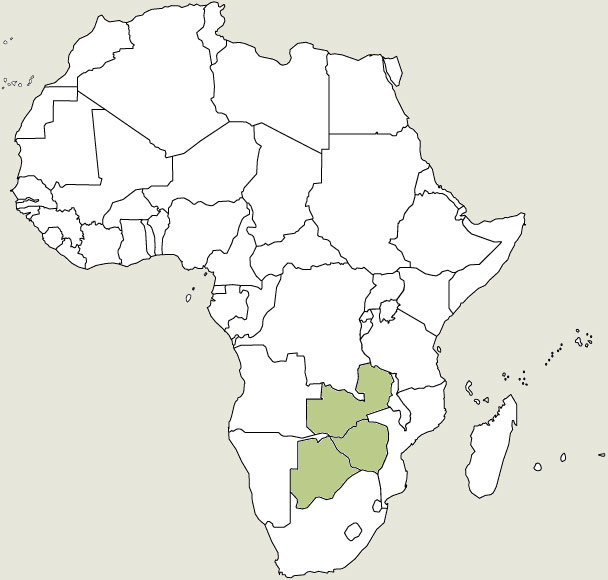 fauna, falls and...frost!
fauna, falls and...frost!
5 September - 9 October 2007
Total kilometers cycled: 28,918
Zambia, Zimbabwe and Botswana
Specific country info on routes & roads/food & accommodation/the locals available here.
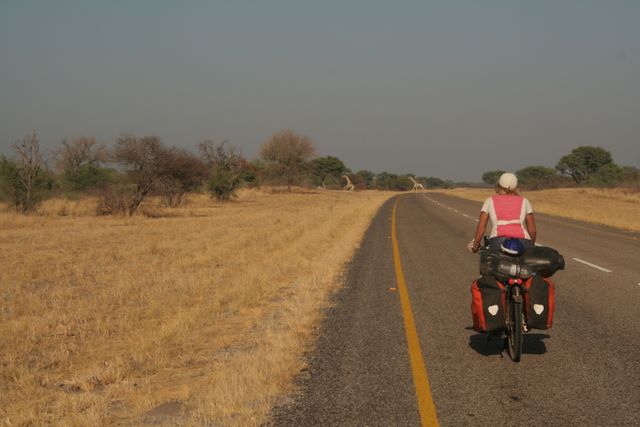 Graceful
giraffes loping across the road, unhurried hippos munching next to the
tent and enormous elephants wandering through the campsite: and
there's even more to see inside
the national parks! Bicycle is probably not the best means of transport
in this part of Africa where hungry lions roam freely, elephant dung
litters the roadside and families of warthogs are far more common than
any of the human variety. Distances between settlements are long,
water is scarce, the wind can be fierce and the sun is unrelenting.
Reasonably smooth, flat paved roads is the only concession
this harsh environment makes for foolhardy cyclists bent on tackling the
region.
Graceful
giraffes loping across the road, unhurried hippos munching next to the
tent and enormous elephants wandering through the campsite: and
there's even more to see inside
the national parks! Bicycle is probably not the best means of transport
in this part of Africa where hungry lions roam freely, elephant dung
litters the roadside and families of warthogs are far more common than
any of the human variety. Distances between settlements are long,
water is scarce, the wind can be fierce and the sun is unrelenting.
Reasonably smooth, flat paved roads is the only concession
this harsh environment makes for foolhardy cyclists bent on tackling the
region.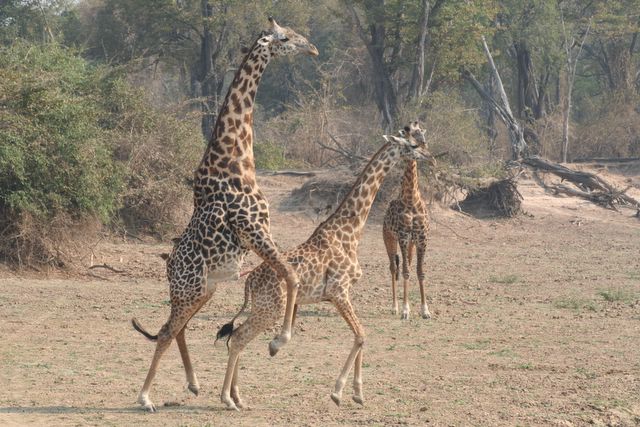 Fortunately we didn't meet up with any lions while we were pedaling,
although plenty of locals warned us about their presence in the
Maun-Nata area in Botswana. 'Don't sleep in the bush whatever you
do!' was a common refrain. 'A soldier was eaten last year,
only thing left was his boots'. Hmmmm. Some food for
thought.
Fortunately we didn't meet up with any lions while we were pedaling,
although plenty of locals warned us about their presence in the
Maun-Nata area in Botswana. 'Don't sleep in the bush whatever you
do!' was a common refrain. 'A soldier was eaten last year,
only thing left was his boots'. Hmmmm. Some food for
thought.Our lion sighting came from the (relative) safety of a Land Rover while we were on safari at South Luangwa National Park in Zambia. I say relative safety because our guide insisted on driving right up within arm's
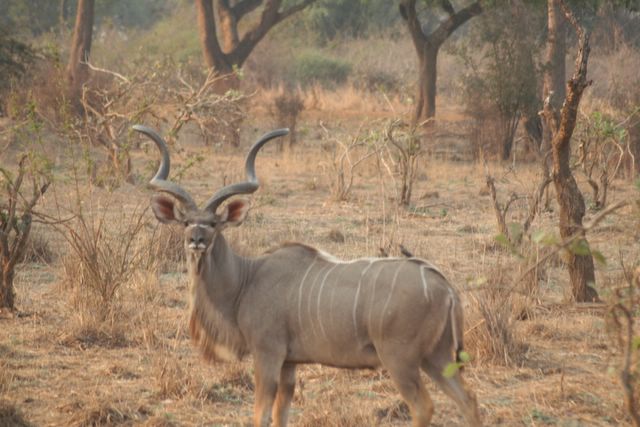
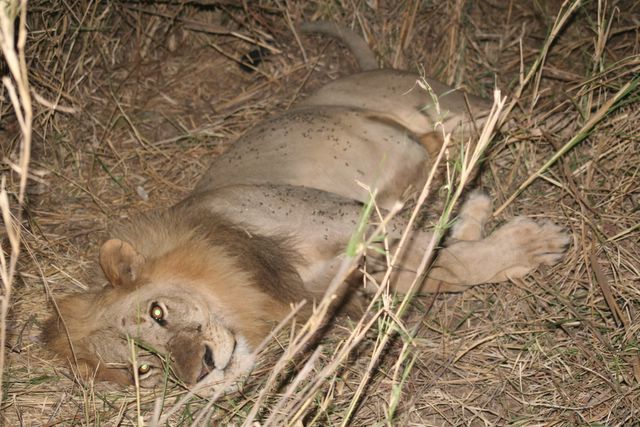 reach
of the lion whose chest was heaving from the
effort of digesting his most recent kill, a hapless zebra whose carcass lay nearby.
Apparently lions in this state are so satiated and lethargic
that a Landy full of tourists won't stir up ideas of dessert.
On our two safaris with Flat Dogs Camp we saw crocs basking on the
shores of the Luangwa River, amorous giraffes mating, elephants
wandering through the tall caramel-colored grass, and numerous
kudos, pukas, impalas and zebras--only the leopard remained elusive.
reach
of the lion whose chest was heaving from the
effort of digesting his most recent kill, a hapless zebra whose carcass lay nearby.
Apparently lions in this state are so satiated and lethargic
that a Landy full of tourists won't stir up ideas of dessert.
On our two safaris with Flat Dogs Camp we saw crocs basking on the
shores of the Luangwa River, amorous giraffes mating, elephants
wandering through the tall caramel-colored grass, and numerous
kudos, pukas, impalas and zebras--only the leopard remained elusive.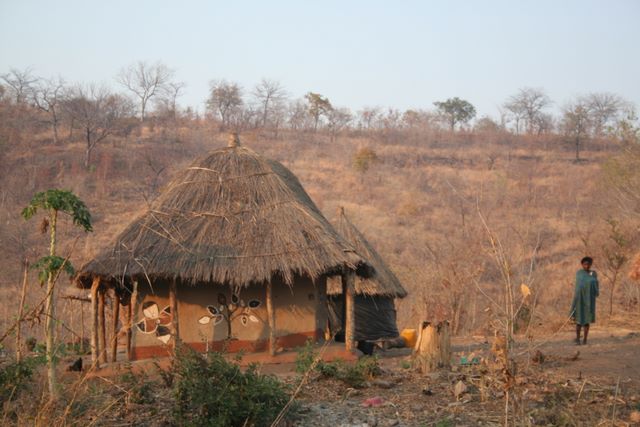
In Zambia we started seeing bikes with the World Bicycle Relief logo. Being curious as to what this is all about, we stopped a few riders to find out more. The enthusiastic new bicycle owners explained that they had received the bikes free because they were essential community workers. One man we met is a care giver for HIV patients and makes home visits to deliver food and medicine and a woman we met is a primary teacher at a rural school. Both were thrilled
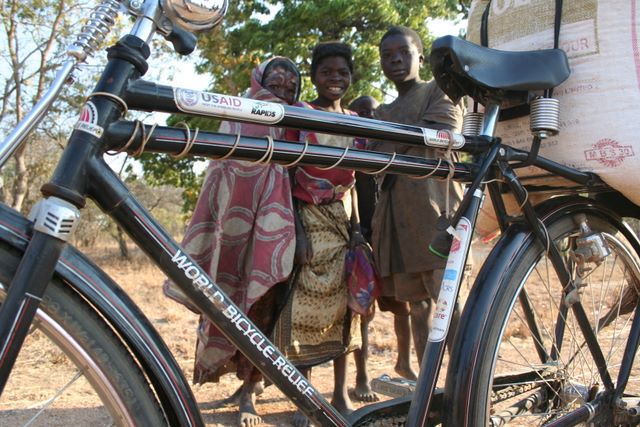 d
to have bicycles because this means they don't have to waste many hours
walking and they can put more effort into their work. A simple and cost
effective initiative that is making a real difference in the lives of
Africans. Surely this is more sensible than trying to give every
African child a laptop.
d
to have bicycles because this means they don't have to waste many hours
walking and they can put more effort into their work. A simple and cost
effective initiative that is making a real difference in the lives of
Africans. Surely this is more sensible than trying to give every
African child a laptop.The Zambians we met were some of the most cheerful and friendly people we've run into so far on the trip--everybody seemed to be on a happiness high and the women in particular were always laughing and joking with each other. We asked several people what the trick was to being so upbeat and the answer always went something like this: 'It's just our way. We suffer, of course, but we
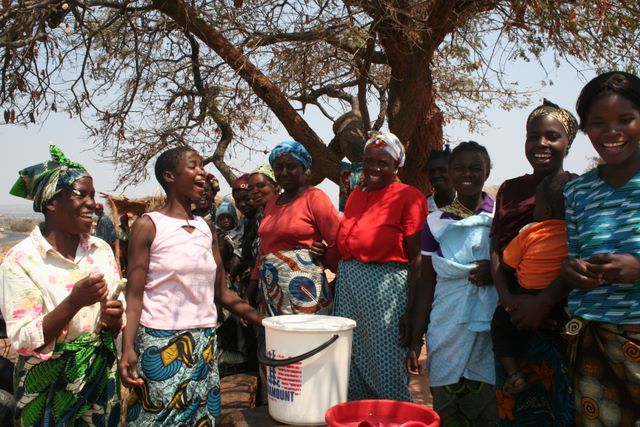 must go on and make the best of what God has given us. That's how we can be happy even with all our troubles'.
must go on and make the best of what God has given us. That's how we can be happy even with all our troubles'.Religion looms large in the life of most Africans and along with the Catholics, Presbyterians and Methodists there are an increasing number of evangelical churches and sects that are gaining in popularity on the continent. The well-kept Kingdom Halls of the Jehovah's Witnesses are a common sight even in very remote areas. We shouldn't have been surprised, then, when we pedaled into a small village just before sunset and starting in on our usual spiel about needing a place to pitch our tent and could we please see the headman,we were lead instead to Elder Samson who took us to the Kingdom Hall compound.
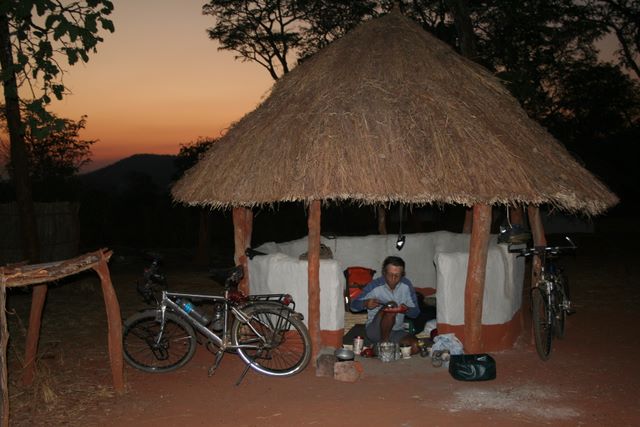 These
people are obviously getting a lot of money from the church's New York
headquarters because they'd constructed a whole village within the
village just for Jehovah's Witnesses gatherings (and the odd itinerant
cyclist). Immaculate huts, showers, toilets and even their own
bore hole. One of our favorite campsites.
These
people are obviously getting a lot of money from the church's New York
headquarters because they'd constructed a whole village within the
village just for Jehovah's Witnesses gatherings (and the odd itinerant
cyclist). Immaculate huts, showers, toilets and even their own
bore hole. One of our favorite campsites.Yes, we enjoyed camping at their compound but maybe the Jehovah's Witnesses need more practice at drilling bore holes. When Amaya complained about the shiny metallic substance floating in her water Eric's rather unconvincing explanation was that it was only iron and iron is good for the body, so she should drink up, which she did and regretted doing for the next two days as she lay moaning and groaning in the stifling tent. This meant Eric had some time to explore Lusaka on his own. It's a modern city with 4- lane highways and soulless shopping malls where bicycles aren't allowed to be parked near the entrance because it spoils the image and a small army of security guards chase away beggars and hawkers. On the upside everything imaginable is trucked up from South Africa so the supermarkets are chock-full of tempting treats. The only problem is that everything seems to cost at least the double of what you would pay in North America or Europe.
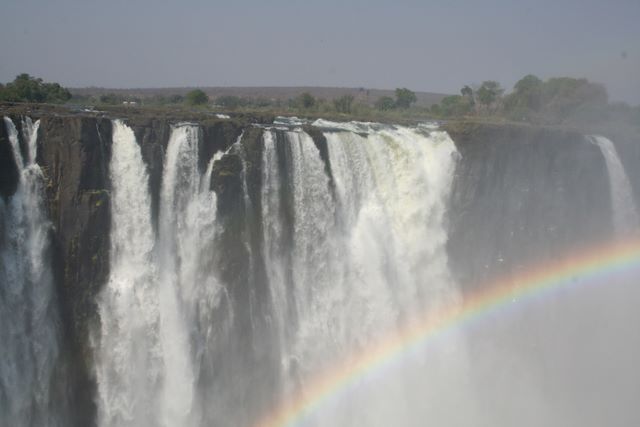 After Amaya's stomach had recovered we set off towards Livingstone and Victoria Falls. 'The
Smoke that Thunders', as the falls are known in the local language,
were impressive even though this being the dry season the flow was only
about 10% of what it is during the rains. After a few days
relaxing poolside at backpacker mecca Jollyboys,
we headed across the Zambian border into Zimbabwe to get another
perspective of the falls and find out for ourselves if all the stories
of food shortages and empty shops were true. A quick look around
the Spar supermarket confirmed the rumors. No bread, no milk, no
meat. A few light bulbs on the shelves, some laundry detergent, a
couple of jars of jam and a few other odds and ends made up the entire
stock of the grocery store. We'd heard that most everything could
be bought on the parallel market and casually asked an employee if
there wasn't some yogurt to be had. After a quick glance around
to make sure no one was listening he said he might be able to find
something for us in the back. The Bata shoe shop had nothing for
sale, but
After Amaya's stomach had recovered we set off towards Livingstone and Victoria Falls. 'The
Smoke that Thunders', as the falls are known in the local language,
were impressive even though this being the dry season the flow was only
about 10% of what it is during the rains. After a few days
relaxing poolside at backpacker mecca Jollyboys,
we headed across the Zambian border into Zimbabwe to get another
perspective of the falls and find out for ourselves if all the stories
of food shortages and empty shops were true. A quick look around
the Spar supermarket confirmed the rumors. No bread, no milk, no
meat. A few light bulbs on the shelves, some laundry detergent, a
couple of jars of jam and a few other odds and ends made up the entire
stock of the grocery store. We'd heard that most everything could
be bought on the parallel market and casually asked an employee if
there wasn't some yogurt to be had. After a quick glance around
to make sure no one was listening he said he might be able to find
something for us in the back. The Bata shoe shop had nothing for
sale, but 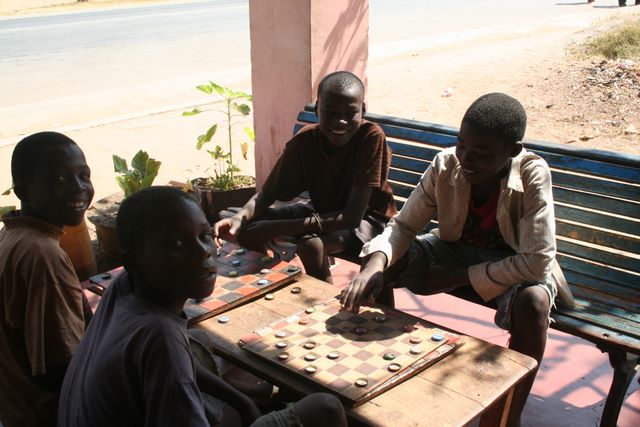 their
was a sign in the window proclaiming 'We buy used Wellington boots'.
The sports shop had a single soccer t-shirt going for 57 million
Zimbabwe dollars. At the official exchange rate of 30,000 Zim$ =
1US $ that would have been around 1,800 US dollars. Of
course nobody changes at the official rate and on the black market
you'll get 10 times more. Since the Mugabe government forced
shop owners to cut food prices in half last June most products have
disappeared from the shelves to avoid selling at a loss. Those with
money can still find a way to get what they need but those less
fortunate simply have to do without. The locals are really
suffering and young people are leaving the country in droves.
Tourists have all but disappeared from Vic Falls and luxury
hotels remain empty . On our short walk through town to the
entrance of the falls we were approached by dozens of hopeful young men
trying their hardest to sell artwork and handicrafts. Everything
was going at rock bottom prices and the sellers were so desperate they
were willing to take our beat-up sandals, old t-shirts or even a bottle
of shampoo in exchange.
their
was a sign in the window proclaiming 'We buy used Wellington boots'.
The sports shop had a single soccer t-shirt going for 57 million
Zimbabwe dollars. At the official exchange rate of 30,000 Zim$ =
1US $ that would have been around 1,800 US dollars. Of
course nobody changes at the official rate and on the black market
you'll get 10 times more. Since the Mugabe government forced
shop owners to cut food prices in half last June most products have
disappeared from the shelves to avoid selling at a loss. Those with
money can still find a way to get what they need but those less
fortunate simply have to do without. The locals are really
suffering and young people are leaving the country in droves.
Tourists have all but disappeared from Vic Falls and luxury
hotels remain empty . On our short walk through town to the
entrance of the falls we were approached by dozens of hopeful young men
trying their hardest to sell artwork and handicrafts. Everything
was going at rock bottom prices and the sellers were so desperate they
were willing to take our beat-up sandals, old t-shirts or even a bottle
of shampoo in exchange. The Wimpy's fast food joint was fully staffed yet there was just one customer when we had a look around lunchtime. Another one of Mugabe's new laws forbids businesses from laying off workers and has frozen wages. With inflation estimated at 6,700 % yearly these 'workers' have virtually no buying power. It is a miracle that the Zimbabweans keep their sense of humor and smile, but some how the do. We popped into local shop to get advice about traveling further through the country but were dissuaded by the prudent shop owner. 'If you had asked me three months ago I would have told you to go without giving it a thought. But now the situation in rural areas has become so bad that the people might just stop you and rifle through your bags looking for food. They're desperate.' she explained.
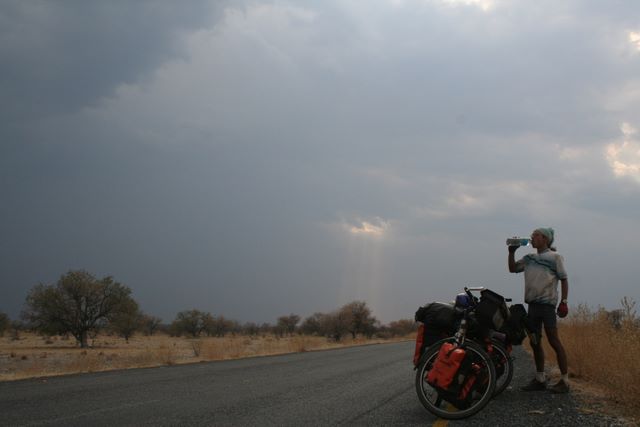 Regrettably
our Zimbabwe tour was limited to Vic Falls and the 70 kilometer ride to
the Botswana border. It is one country we definitely want to
return to one day when the political and economic situation has
improved. CAMFED was started in Zimbabwe and continues to help
the increasing number of needy girls throughout the country complete
their secondary education. Zimbabwe will need an educated workforce to
rebuild the economy once good government has been restored. Click here
to find out more about how you can help.
Regrettably
our Zimbabwe tour was limited to Vic Falls and the 70 kilometer ride to
the Botswana border. It is one country we definitely want to
return to one day when the political and economic situation has
improved. CAMFED was started in Zimbabwe and continues to help
the increasing number of needy girls throughout the country complete
their secondary education. Zimbabwe will need an educated workforce to
rebuild the economy once good government has been restored. Click here
to find out more about how you can help.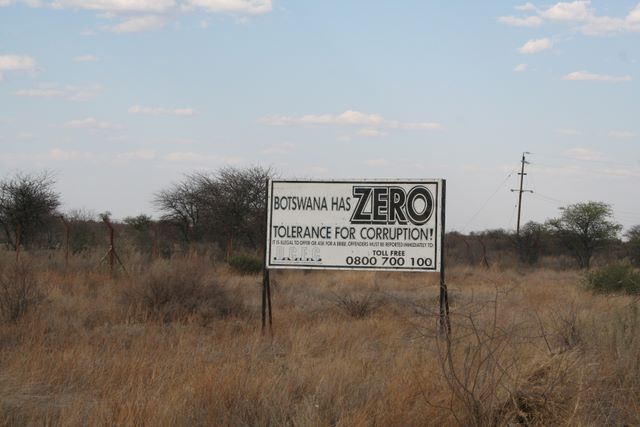 The
Botswana immigration was impressively modern with flat-screen
computers, air-conditioning and efficient clerks. A far-cry from
the ramshackle sheds, ancient ledgers and shiftless officials of West
and Central Africa. We were in and out in a flash with no one
hassling us about a carnet
for the bicycles, a 'processing fee' to be paid or proof that we were
actually tourists. The 'authentic' and far more exotic Africa
that we had a love/hate relationship with had all but disappeared.
In Botswana, water comes from taps, no one shouts Mzungu when
white people pass, vegetables are wrapped in cellophane and come from
the supermarket, roads are paved, electricity cuts are rare and
policemen are your friends.
The
Botswana immigration was impressively modern with flat-screen
computers, air-conditioning and efficient clerks. A far-cry from
the ramshackle sheds, ancient ledgers and shiftless officials of West
and Central Africa. We were in and out in a flash with no one
hassling us about a carnet
for the bicycles, a 'processing fee' to be paid or proof that we were
actually tourists. The 'authentic' and far more exotic Africa
that we had a love/hate relationship with had all but disappeared.
In Botswana, water comes from taps, no one shouts Mzungu when
white people pass, vegetables are wrapped in cellophane and come from
the supermarket, roads are paved, electricity cuts are rare and
policemen are your friends. 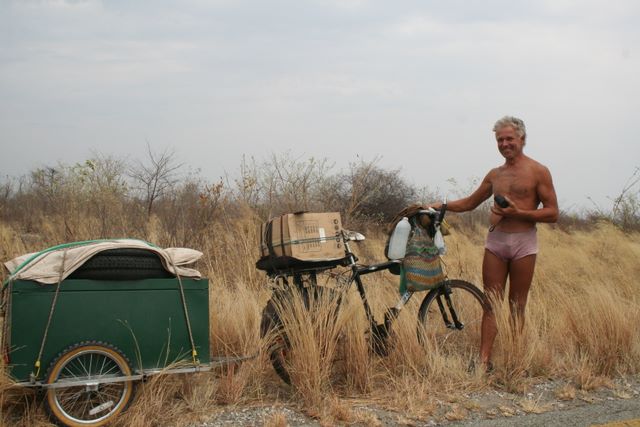 We
got to know the policemen rather well because we spent several nights
camping at their compounds. This was a tip from Russian cyclist
Yuri whom we met on a lonely stretch of road between Pandamatenga and
Nata. As we mentioned earlier in the update, there are lions,
elephants, zebras and giraffes roaming about freely in this part of the
continent so wild camping is not exactly risk-free. The Botswana
police always welcomed us warmly and found a quiet game-free spot in
their compounds for us to spend the night. These were long days
of riding through the bush, skirting around the Kalahari desert where the road seemed to stretch on into
eternity with never a turn right or left for 300 kilometers. The
monotony was only broken up by spotting a group of elephants, zebras,
giraffes or an ostrich bobbing up and down in the distance.
Seeing these animals while on a bicycle
in what felt like the middle of no where was so much more thrilling
than encountering them while on safari with a group of giggling
tourists behind us discussing their nights out partying in Cape Town.
We
got to know the policemen rather well because we spent several nights
camping at their compounds. This was a tip from Russian cyclist
Yuri whom we met on a lonely stretch of road between Pandamatenga and
Nata. As we mentioned earlier in the update, there are lions,
elephants, zebras and giraffes roaming about freely in this part of the
continent so wild camping is not exactly risk-free. The Botswana
police always welcomed us warmly and found a quiet game-free spot in
their compounds for us to spend the night. These were long days
of riding through the bush, skirting around the Kalahari desert where the road seemed to stretch on into
eternity with never a turn right or left for 300 kilometers. The
monotony was only broken up by spotting a group of elephants, zebras,
giraffes or an ostrich bobbing up and down in the distance.
Seeing these animals while on a bicycle
in what felt like the middle of no where was so much more thrilling
than encountering them while on safari with a group of giggling
tourists behind us discussing their nights out partying in Cape Town.We're writing to you from Namibia's capital Windhoek, having covered almost 3,000 kilometers in the last month. The city lies up at 1,700 meters and the weather has been downright chilly with temperatures below freezing one night. The coldest weather in 50 years we're told. But summer is on its way here in the southern hemisphere and we're already enjoying more daylight as the days grow longer. Locals have convinced us to forgo the main road (flat and paved) in favor of heading towards the inland roads (mountainous and rough). We must be fools.
We'll let you know how it all turns out in our next update which should come to you from SOUTH AFRICA. Yes!
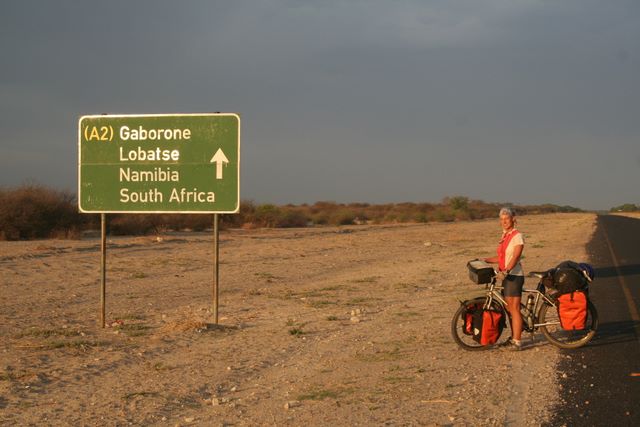
contact us at: worldbiking@gmail.com
Support our chosen charity and help educate girls in Africa-more info here
